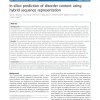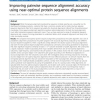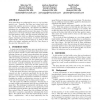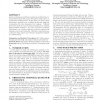447 search results - page 29 / 90 » Improving the aggregating algorithm for regression |
BMCBI
2011
12 years 11 months ago
2011
Background: Intrinsically disordered proteins play important roles in various cellular activities and their prevalence was implicated in a number of human diseases. The knowledge ...
BMCBI
2010
13 years 7 months ago
2010
Background: While the pairwise alignments produced by sequence similarity searches are a powerful tool for identifying homologous proteins - proteins that share a common ancestor ...
DIS
2007
Springer
14 years 1 months ago
2007
Springer
Abstract. This chapter describes how we used regression rules to improve upon results previously published in the Earth science literature. In such a scientific application of mac...
CEAS
2006
Springer
13 years 11 months ago
2006
Springer
Most spam filters are configured for use at a very low falsepositive rate. Typically, the filters are trained with techniques that optimize accuracy or entropy, rather than perfor...
SIGIR
2011
ACM
12 years 10 months ago
2011
ACM
Query performance prediction is aimed at predicting the retrieval effectiveness that a query will achieve with respect to a particular ranking model. In this paper, we study quer...




